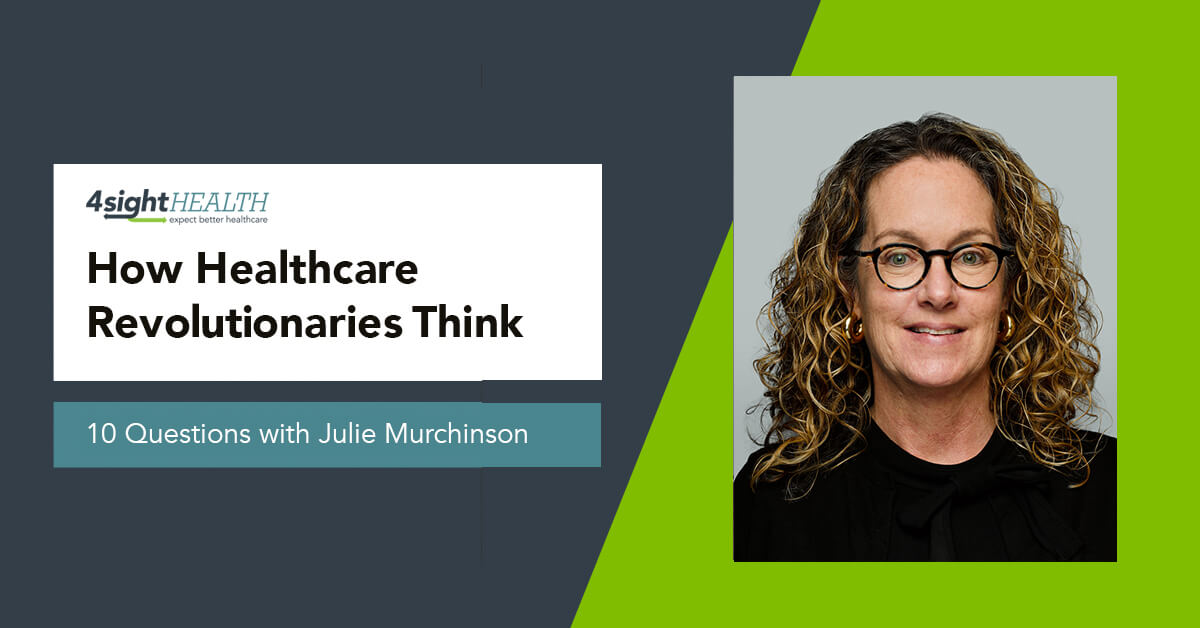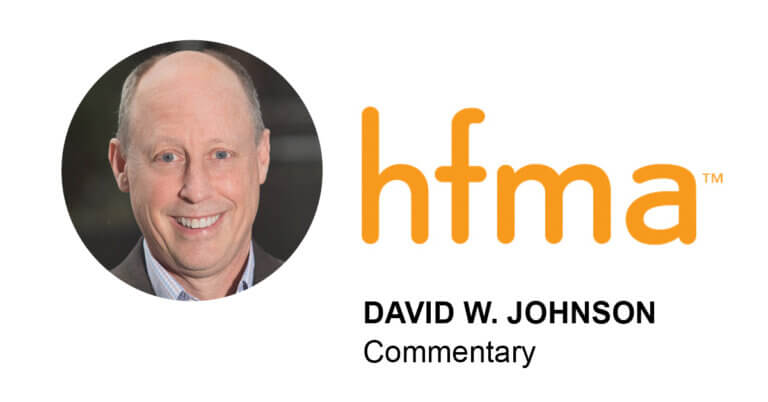September 24, 2024

How Healthcare Revolutionaries Think: 10 Questions with Julie Murchinson
Welcome to the latest installment of 4sight Health’s series, How Healthcare Revolutionaries Think. Our interview series profiles healthcare instigators who believe that outcomes matter, customers count and value rules.
 Julie Murchinson is someone who bankrolls the instigators. Murchinson is a partner at Transformation Capital, a Boston-based digital health venture capital firm. What makes Murchinson good at her job is the fact that you can’t fool her. She’s pretty much seen it all. She’s pretty much talked with everyone in healthcare. As vice president, services, at CareScience. As co-founder and partner at Object Health. As managing director at Manatt Health. As Health 2.0 Accelerator co-founder. As CEO of Health Evolution. As executive in residence at AVIA and Scottsdale Institute. As an NCQA board member.
Julie Murchinson is someone who bankrolls the instigators. Murchinson is a partner at Transformation Capital, a Boston-based digital health venture capital firm. What makes Murchinson good at her job is the fact that you can’t fool her. She’s pretty much seen it all. She’s pretty much talked with everyone in healthcare. As vice president, services, at CareScience. As co-founder and partner at Object Health. As managing director at Manatt Health. As Health 2.0 Accelerator co-founder. As CEO of Health Evolution. As executive in residence at AVIA and Scottsdale Institute. As an NCQA board member.
At the same time, Murchinson doesn’t know it all. Listening to her describe her amazement at people who have come up with new processes and technologies to fix healthcare is like watching a wide-eyed 6-year-old opening up birthday present after birthday present after birthday present.
It’s what makes Murchinson the ideal guest expert on the weekly 4sight Health Roundup podcast with David Johnson, founder and CEO, of 4sight Health. As the moderator, I pick the topic and let Murchinson and Johnson do the rest. I learn something from every episode.
As I did with this interview with her for our How Healthcare Revolutionaries Think series. You also can listen to Murchinson’s thoughts on generative AI in healthcare on this accompanying podcast.
1. Julie let’s start with the question we ask everyone, and that’s your definition of a healthcare revolutionary.
Murchinson: My definition is not some unicorn. A healthcare revolutionary is just a very savvy problem solver who eats, drinks and sleeps change. We’ve seen so many revolutionaries, but you need to be willing to think and act really differently while at the same time respecting the way things work. We’ve seen a lot of innovators who have thought really differently but haven’t had that respect but have thought differently. We’re now in a wave in which we’re seeing many people who think very differently, and they respect how to push things through to the other side. They come in so many shapes and sizes and flavors.
2. Let me ask you about that respect part. What do you mean by that? You want to be a savvy decision-maker, but yet you want to respect what? People? The system? How things were done in the past?
Murchinson: The complexities and the weight of the industry create what a lot of people would describe as incrementalism. Incrementalists can be revolutionaries, but you have to be able to see incrementalism through to a different way of doing things, a better way of doing things, while respecting the healthcare system’s complexities and how to help mold them. I see innovators today who are thoughtful, and they ask themselves, “Do I have to actually do it myself or can I look at where there’s fabric to attach myself to in order to grow a bigger concept that drives change?” You can’t just come in and think you’re going to change healthcare overnight, which is where we were 10 and 15 years ago.
3. Healthcare revolutionaries come in many flavors as you said. If you had to pick a flavor, who’s your favorite, past or present?
Murchinson: You know me, I don’t have just one. Let’s talk about a few from the past. There’s no doubt that the late Leeba Lessin, founder of CareMore Health, really changed the game and value-based elder care. She was incredible. Her dedication and innovation in the industry lives on today. The late Shawn Leavitt, godfather of aggressive employer approaches. He drove a different standard for employers in health benefits, and we haven’t seen that same kind of leadership since.
Today, I love people like Molly Coye, M.D. She doesn’t have an idea that’s not revolutionary and is the energizer bunny. Sachin Jain, M.D., I love. Not just for what he’s doing at SCAN Health Plan, but how he’s thinking about leadership and lessons learned to help people become better executives, managers, leaders, he’s game changing in terms of his mentorship of the masses. Janice Nevin, the president and CEO of ChristianaCare, is literally revolutionizing how we execute compassionate care. She has changed how people talk about care and love and health.
Roberta Schwartz at the Houston Methodist Center for Innovation is revolutionizing what tech-enabled clinical care looks like inside an acute-care center. That’s real. The stuff she’s doing is definitely real. Last, Mark Smith, the first CEO of the California Health Care Foundation. He revolutionized how philanthropy scales its impact through not only policy and strategic grant-making but through innovation funding and public-private partnerships. Mark is an amazing thinker who pushes other people to think very differently, especially in health equity. There’s my list. I could go on and on and on.
4. What thread connects all the people you mentioned? Is it the respect you alluded to earlier?
Murchinson: Yes. It’s being progressive. It’s allowing vulnerability to be part of how they create. And it’s being practical. There’s a practical nature to what all these people understand about the system and how to problem solve, how to make change, within that system.
5. Given all that, would you put yourself in their company? Do you consider yourself a healthcare revolutionary?
Murchinson: I don’t know about that. I like to think I’m someone who knows how to spot them. I’m good at that. I spent the first half of my career working with large organizations that deliver care, pay for care, deploy product and services. Now, in the second half of my career, I’m spending most of my time with creative, thoughtful, energetic, passionate innovators who truly believe they can change the world. When you spend enough time with both those groups, you definitely start to see revolutionary traits in people.
6. If your superpower is spotting real healthcare revolutionaries, then you’d also have the power to spot phony healthcare revolutionaries, right? Is that one of your skills as well?
Murchinson: Phony isn’t the right word. Maybe misguided? Or overly enthusiastic? Or not practical? It’s not about phony. It’s about understanding all the different pieces and being willing to work it inside a really complex system. I think more than 20% have a fighting chance.
7. What’s your healthcare origin story? And how did that story affect how you think about healthcare?
Murchinson: I hadn’t given healthcare a ton of thought until my first year out of college. I was a public accountant, which I don’t really talk about a lot. My clients were Mobil Oil, a commercial bank and the Inova Health System. Mobil oil was a fascinating set of global businesses, a plastics business and the oil and gas business, and then all these brownfield sites because they destroyed the earth. It was so, so interesting. But there was too much bad in those types of businesses to make me feel good about that work.
The commercial bank was all zeros and ones. It just put me to sleep. That was not at all intriguing to me.
Working with Inova, I discovered this industry built to keep people alive, literally, and funded by multiple complex revenue streams that are largely paid for twice by many of the same people. We, as employees, are paying for healthcare. We, as taxpayers, are paying for healthcare. We’re paying a lot of money for this system. If that wasn’t interesting enough, I also discovered that everything was on paper. This was 1992 to four to five. Gosh, I’m old. It seemed like an industry that needed fixing, and I’ve been working on several of those angles ever since.
8. Please. My first story as a full-time journalist was on the “advent” of DRGs in November 1983. But I digress. Does your superpower extend to business plans and business models of healthcare start-ups? Can you spot the flaws in a business model pretty quickly?
Murchinson: There are so many nuances to a business model. There are several models that can work. It’s not like one business model is the golden ticket. What makes the difference is when you have a CEO and a company that just sells the vision versus actually solve a problem with their solution. Its about how you are solving problems that drive revenue, drive lower cost, drive improved something, and not just selling the vision of what it will look like on the other side. Some business models could work in 2040 but not today. Understanding the pace of the market is big. Your business model has to match the times. That gets back to listening and following the money.
9. You clearly attend a lot of healthcare events to see what’s out there that’s new and decide who the real healthcare revolutionaries are with business models that match the times. Do you have a favorite event right now?
Murchinson: The one event I’m loving the most right now is the Behavioral Health Tech Conference. It’s really the power and the passion from the founder that comes through in every way in that event. Hats off to Solome Tibebu, founder and CEO of Behavioral Health Tech. She’s created the mecca for behavioral health problem solvers and innovators. We’re at a point with too many events, too many people getting together, too much time spent interacting. It will all play out in the next few years, and we’ll get back to normal. She’s done a great job in a space that’s so important. I haven’t seen this strong of a tailwind for an event in a long time.
10. Let’s end on a personal note. How much of what you think about healthcare comes from you being a woman, a wife, a mother, a caregiver for other family members?
Murchinson: My personal healthcare journey has many chapters. I’ll just tell you about one. The bedrest chapter where I saw firsthand the inner workings of acute care for six weeks across two kids and two C-sections that I can’t confidently say were 100% necessary. I saw vital signs written on paper towels and misread orders leading to potential unnecessary lab work in the middle of the night. I saw amazing and attentive nurses, extraordinary nurses, and very little of the doctors. So much wasted time. Horrible TV access. The food. Nothing healthy about the food. Between that and going to the hospital cafeteria years ago with an executive who jokingly said to me that the unhealthy food was good for the business model. That says it all right there.
Burda’s Final Bit
We’re all consumers of healthcare either as patients or family members of patients. As consumers of healthcare, we’ve experienced what’s wrong with healthcare. What’s wrong with healthcare is a list so long I won’t go into it. We each deal with those problems in different ways. One way I deal with it is to write about it. I’ve been doing that one way or another for more than 40 years. I’ve never stepped into the ring myself.
Julie Murchinson stepped into the ring the first chance she got. Big time. With both feet. At every stop during her career, she’s challenged the healthcare system to become better. Murchinson’s incentive of choice is market innovation. Rather than seeking help from the government, she’s looking to smart and innovative people — budding healthcare revolutionaries — to make the healthcare system work for us.
That’s what makes Murchinson revolutionary.
Julie Murchinson is a partner at Transformation Capital. She has a Bachelor of Arts degree in business management and accounting from Franklin and Marshall College in Lancaster, Penn., and her master’s in business administration from the Wharton School at the University of Pennsylvania. Learn more.
Transformation Capital is a Boston-based digital health venture capital firm. Founded in 2016, it now manages more than $1.6 billion in investments in more than three dozen digital health companies.
Read more interviews with healthcare revolutionaries
Healthcare Revolutionary David Terry
Healthcare Revolutionary Matt Marek
Healthcare Revolutionary Mark Engelen
Healthcare Revolutionary Chris Johnson
Healthcare Revolutionary Ramona Wallace, D.O.
Healthcare Revolutionary Alejandro Quiroga, M.D.
Healthcare Revolutionary Samir Goel
Healthcare Revolutionary Marcus Whitney
Healthcare Revolutionary Demi Radeva
Healthcare Revolutionary Michael Pitt, M.D.
Healthcare Revolutionary Rebeckah Orton
Healthcare Revolutionary Dan Trigub
Healthcare Revolutionary Bruce Brandes
Healthcare Revolutionary Lena Chaihorsky
Healthcare Revolutionary David Nash, M.D.
Healthcare Revolutionary Esther Dyson
Healthcare Revolutionary Meghan Conroy
See if your favorites are included in the series and let 4sight Health’s David Burda know who you consider to be a Healthcare Revolutionary.




